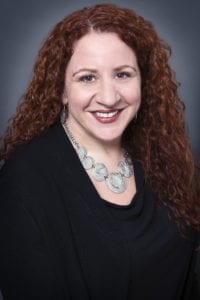By Lee Chottiner
Community Editor
Melanie Maron Pell moved home to her native Louisville in 2013, giving her employer, the American Jewish Committee (AJC), an informal presence in her hometown.
The managing director of regional offices, Pell oversaw the network of 22 AJC offices across the country – all from her home.
But that changed on Thursday, June 18, when AJC President David Harris announced the addition of two new offices – one of them in Louisville – which are being established in the names of two black victims of police violence, whose deaths have sparked protests, the toppling of Confederate statues and calls for racial justice.
The Louisville office was started in memory of Breonna Taylor, who was shot to death in her apartment by Louisville Metro Police executing a no-knock search warrant. The second, office, in Minneapolis-St. Paul, Minnesota, is in memory of George Floyd, who died when a Minneapolis officer knelt on his neck for over eight minutes despite his pleas that he couldn’t breathe.
“We have more than a century of experience in our unswerving commitment to the civil rights struggle,” Harris said in a statement. “AJC will bring that dedication and experience to the Twin Cities and Louisville. We want to contribute to the solution on the ground and do so in close partnership with likeminded institutions and individuals.”
Pell, who will keep her current title, will head up the Louisville office. She expects AJC’s formalized presence here to equal closer working relationships with elected officials and organizations with similar missions, including the Jewish Community Relations Council.
In fact, she said she is in talks with the JCRC about ways the two entities can work together.
“We’re figuring out what it would look like and what it would be,” Pell said, noting that the establishment of AJC-Louisville will “catalyze” an already formal relationship with the JCRC and the Jewish Community of Louisville as a whole.
JCRC Director Matt Goldberg said Pell and the AJC have already partnered on establishing the 12th region of the Muslim Jewish Advisory Council – an AJC initiative – which was rolled out in Louisville last December.
“Melanie Pell has been a valued member of the Jewish Community Relations Council for years,” Goldberg said in a statement. “We are very pleased to see that she will be leading AJC’s efforts in Louisville.”
Describing herself as “the face of AJC to elected officials in Kentucky,” Pell said a major part of her work will be to “deepen” relationships between mayors, the governor and other statewide officials with the State of Israel.
She said the AJC can connect officials here with their Israeli opposites and provide travel opportunities there. She even expects Louisville Mayor Greg Fischer to lead a delegation of city officials to Israel next year when he becomes president of the U.S. Conference of Mayors.
Trips to Israel this year by UofL President Neeli Bendapudi and Dean of Students James “Michael” Mardis had to be put off because of the coronavirus/COVID-19 pandemic. Pell hopes they can be rescheduled as she recruits new travelers from other colleges and universities.
“What we’re always trying to do with mayors and secretaries of states is not only connect them to their Israeli counterparts, but to Israeli technology and innovation to help them do their jobs,” she said.
Pell cited a virtual conference in March in which secretaries of state met with Israeli officials, who had just conducted a national election during the pandemic. She said the Americans plied them with questions about social distancing and other safeguards during the voting.
But racial justice will remain one of her highest priorities.
“We are fiercely and authentically nonpartisan, but we are deeply committed to our values and the protection of democratic values and our beliefs that a pluralistic nation is a healthy nation,” Pell said. “The protection of our institutions of democracy is essential. If they are challenged, then yes, we will be there.”
Pell said the establishment of the Louisville and Minneapolis-St. Paul offices had been talked about for years. But the deaths of Taylor, Floyd – and many others – plus the demonstrations that ensued, fast-tracked both ideas.
“In this moment, it felt like the right time to formalize this.”



